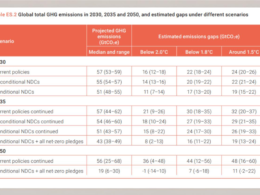The Monetary Authority of Singapore (MAS) has released key findings from the Transition Credits Coalition (TRACTION) Final Report and issued a Statement of Support for Energy Transition Credits, aimed at developing energy transition credits as a credible financing mechanism to accelerate the shift from coal to clean energy in Asia.
TRACTION, a multi-stakeholder initiative convened by MAS at COP28, brings together more than 30 partners across the public and private sectors. The Final Report highlights how energy transition credits could help reduce coal-related emissions, which currently account for about one-third of Asia’s total greenhouse gas emissions, while supporting a Just Transition for affected communities.
Key findings from the TRACTION Final Report
According to the report, Asia has significant potential to generate high-integrity energy transition credits, with an estimated 1 gigatonne of CO₂ equivalent in possible annual emissions reductions from eligible coal-fired plants across 15 markets. However, success depends on region-specific approaches that balance decarbonisation with energy reliability and affordability.
The report also underscores the need for predictable carbon revenues, innovative financing models, and demand signals from credible buyers to ensure scalability. A Just Transition, it notes, should be central to all early coal retirement efforts, ensuring community development, retraining, and affordable access to clean energy.
Demand for energy transition credits is rising, with mechanisms such as advanced market commitments and buyer coalitions seen as key to aggregating demand and supporting a pipeline of high-integrity projects.
Broad industry participation and next steps
A total of 21 public and private entities, including the Government of Singapore, have signed the Statement of Support, signalling their interest in participating in energy transition credit projects through offtake, financing, or underwriting arrangements.
The next phase of TRACTION’s work will focus on translating the report’s recommendations into concrete projects and transactions, led by partners such as the Rockefeller Foundation and the Kinetic Coalition, with an emphasis on integrity, scalability, and demand creation.
Global perspectives
“The case for Asia’s coal-to-clean transition remains compelling,” said Leong Sing Chiong, Deputy Managing Director (Markets and Development) at MAS. “TRACTION’s work demonstrates that energy transition credits can serve as a credible financing instrument to accelerate this transition while ensuring it is inclusive and economically viable.”
Amy Merrill, CEO of the Integrity Council for the Voluntary Carbon Market (ICVCM), said the findings highlight the importance of “upholding high-integrity principles and centring Just Transition considerations in transition credits.”
Tim Gould, Chief Energy Economist at the International Energy Agency (IEA), noted that “a variety of financing instruments are needed to help countries achieve secure and sustainable energy systems,” and welcomed TRACTION’s efforts to advance high-integrity credit mechanisms.
Nat Keohane, President of the Center for Climate and Energy Solutions (C2ES), said initiatives like TRACTION and the Kinetic Coalition are helping “deliver abundant, affordable, clean energy systems around the world.”
Elizabeth Yee, Executive Vice President of Programmes at the Rockefeller Foundation, added that high-integrity transition credits “empower communities to make the best energy decisions for their well-being,” while Vivek Kumar, CEO of WWF-Singapore, described TRACTION as “a vital step towards responsible coal phase-out through collective action.”
















